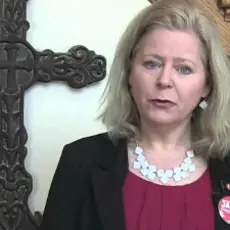Mississippi is set to vote this November on a patently unconstitutional personhood amendment that would criminalize abortion in their state, and ‘personhood’ advocates now strive to put a similar amendment on the ballot in Ohio in 2012. Personhood laws would not only prohibit abortion in all cases but also ban certain forms of birth control and the treatment of ectopic pregnancies by giving legal rights to zygotes. The anti-choice activists hope that Ohio will vote on it at the same time as the swing state’s closely contested presidential election. Right now Ohio is on the brink of passing Janet Porter’s ‘Heartbeat bill’ that would ban abortion in the vast majority of cases, but Porter has taken heat that her prized legislation doesn’t go as far as personhood laws.
The American Family Association, which is financing the personhood campaign in Mississippi, reports that Personhood Ohio, the state affiliate of Personhood USA, wants the amendment, if passed, enforced even if it is struck down by the courts. “There's a firm legal precedent that when the judiciary rules unconstitutionally and immorally, that we have no obligation to respect that law any more than if they would have ordered us to kill our wives,” said Patrick Johnston of Personhood Ohio, “We don't have to obey them:
A campaign is under way in Ohio to place a Personhood Amendment on the 2012 ballot.
Article 1, Section 1 of the Ohio Constitution currently reads: "All persons are, by nature, free and independent and have certain inalienable rights, among which are those of enjoying and defending life..." The Personhood Amendment would add that "the word 'person' or 'persons' applies to every human being at every stage of biological development of that human being or human organism, including fertilization."
The idea is to amend the state constitution to define that a person is a person when human life begins at conception or fertilization. Dr. Patrick Johnston of Zanesville, a family physician who heads the campaign, says the constitutional addition would protect all unborn babies in Ohio, without exception. Personhood Ohio volunteers must now obtain 380,000 signatures to call for the election.
"It's a good state to go directly to the voters to gather enough signatures, and then go to the voters and the ballot box and bypass the committees that end up corrupting good pro-life legislation in the House of Representatives and the Senate," Johnston explains.
That corruption, he sayts [sic], reaches the point where exceptions are made that result in abortions. But he believes Ohio's pro-life leaning is strong, so even if a court rules against it, it does not necessarily mean anything.
"There [are] several constitutional measures we can take," the physician asserts. "One is we can ignore it. There's a firm legal precedent that when the judiciary rules unconstitutionally and immorally, that we have no obligation to respect that law any more than if they would have ordered us to kill our wives. We don't have to obey them."





